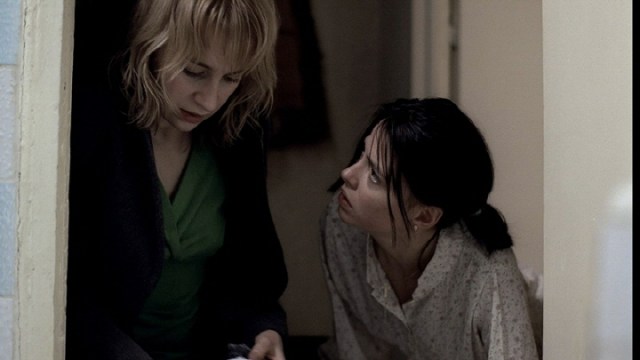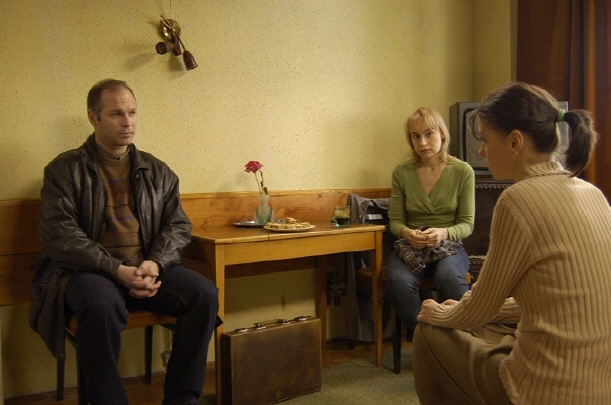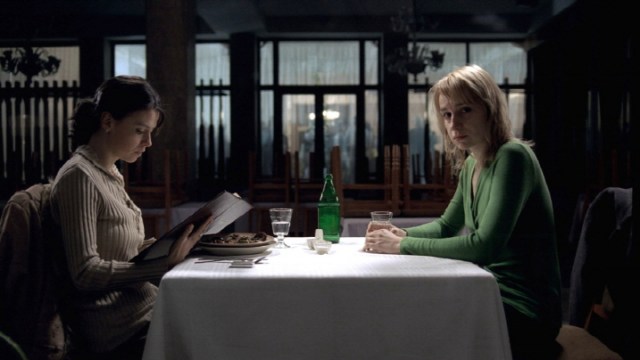
I still remember well how much I was chilled by one particular moment in Cristian Mungiu’s “4 Months, 3 Weeks and 2 Days”, a stark, sobering drama film set in Romania during the final years of Nicolae Ceaușescu’s communist regime. At first, we merely watch a mundane conversation between its two main characters and someone they must deal with, but the mood gradually becomes intense and ominous step by step, and then there suddenly comes to us a gut-chilling moment of epiphany on the enormous price they will have to pay for getting what they need right now.
They are Otilia (Anamaria Marinca) and Găbița (Laura Vasiliu), two young female college students living together as roommates in some shabby college dormitory. As it is gradually revealed to us during the first act of the movie, Găbița has recently been pregnant, and she wants have an abortion as soon as possible, but there is no hospital or clinic for that. The time is 1987, and it has been more than 20 year since a strict state ban on abortion was enacted by Ceaușescu in 1966 just for getting more citizens to be oppressed and controlled under his brutal totalitarian rule.
As Găbița’s best friend, Otilia is certainly willing to help Găbița, and the opening sequence of the movie shows how resourceful Otilia is in getting what she and Găbița need. Because many commodities are quite difficult to get due to the poor economy of their country, black markets have thrived for many years, and we are a bit amused while Otilia busily goes around here and there in her dormitory for dealing with several other students willing to sell some simple commodities such as a bar of soap.

It initially seems that all Otilia has to do for her friend is 1) making a good excuse for their two-day absence in the dormitory, 2) checking out the room reservation at a local hotel, and 3) staying besides Găbița while abortion is performed on her. Unfortunately, things do not go that well from the very beginning mainly thanks to Găbița’s utter incompetence. When Otilia comes to that hotel in question, she belatedly finds that the room reservation was cancelled because Găbița did not confirm it on the previous day, and she has no choice but to get a room in some other hotel instead at a rather expensive price. While Găbița was supposed to meet a guy who is going to perform an illegal abortion on her, she later becomes afraid and hesitant, so Otilia will go to a spot where that man will be waiting.
In addition, there is also a matter involved with Otilia’s boyfriend Adi (Alexandru Potocean). His mother is going to have a birthday party with her family and friends in the evening, and he wants Otilia to come to the party and then spend some time with him. Although she knows well that she will probably not have enough time, Otilia promises to him anyway that she will come to the party, while not telling him what she and Găbița are soon going to do.
The situation becomes more complicated after Otilia meets Mr. Bebe (Vlad Ivanov), the aforementioned illegal abortionist. While surely not so pleased about the unwanted changes in the circumstance, he comes into a hotel room Otilia manages to secure, and it does not take much time for him to discern how unprepared Otilia and Găbița are. For example, when he examines Găbița’s pregnant body, it immediately turns out that she lied to him about the current status of her pregnancy, and he coldly reminds her and Otilia that their legal risk is now much bigger because of that.

As Mr. Bebe corners Otilia and Găbița word by word during their extended conversation scene, cinematographer Oleg Mutu’s handheld camera rigorously sticks to its unflinching position, and the tension growing beneath on the surface is palpable to say the least. Although he does not demand anything to them directly, Mr. Bebe relentlessly and mercilessly pushes Otilia and Găbița further toward a certain inevitable point, and you will soon get an experience akin to a light bulb turned on in your head to illuminate an awful fact right in front of you. Subtly revealing his character’s cold, heartless evil Vlad Ivanov is effectively despicable in his supporting role, and we become more shocked and repulsed as observing how his character phlegmatically does his job shortly after coercing Otilia and Găbița to make an impossible choice.
Once he leaves the room, the mood feels a bit less tense than before, but then we are served with more emotional gut punches. There is a calm but emotionally shattering scene between Găbița and Otilia, who is understandably quite exasperated and frustrated with her friend’s sheer stupidity while also devastated a lot by what happened to her and her friend because of that. There is a very uncomfortable sequence showing the birthday party for Adi’s mother, which will often make you cringe for what Otilia has to endure for her petty boyfriend and his family. And there is also a brief but shocking moment where Otilia faces the ultimate consequence of the choice made by her and Găbița, who does not take much of her responsibility even at that point and has her friend take care of her mess instead.
The movie is definitely not something you can casually watch on Sunday afternoon, but it keeps holding our attention with its realistic period atmosphere and details, which make us more immersed in the moody and oppressive society surrounding the characters in the film. Every scene in the film is presented via thoughtful scene composition and meticulous camera work, and many of them are presented in steady unbroken shot to generate maximum dramatic effects. In case of one particularly memorable long-take shot in the movie, it simply shows Otilia and her boyfriend stuck in the middle of his mother’s birthday party, but, as the camera tensely focuses on Otilia’s face for several minutes, we sense more of the accumulating anxiety, frustration, and exasperation behind her seemingly detached façade, and the movie also slyly makes a point on the apparent class/generation gap between Otilia and other characters in that scene.

Above all, the movie is anchored well by the strong performances from Annamaria Marinca and Laura Vasiliu. As an ordinary but resilient woman who must handle an increasingly grim and frustrating situation for her friend as well as herself, Marinca is quite harrowing during some of the darkest scenes in the film, and she is superlative especially during a number of key moments which depend a lot on her plain pale face. While often overwhelmed by anger, despair and exhaustion, Otilia does not lose any of her courage, resourcefulness, and compassion, and Marinca masterfully balances herself well between her character’s strength and vulnerability while drawing more care and empathy from us.
If Otilia shows how defiant and selfless some people can be under an oppressive system, Găbița demonstrates how cowardly and selfish others can be under the same condition, and Vasiliu is believable in her mousy appearance while brilliantly complementing her co-performer. We cannot help but shake our heads whenever we behold how clueless and self-centered Găbița is, but Vasiliu somehow makes us have some sympathy toward her character, and we come to see why Otilia still stands by her friend even in the end. Although their friendship seems irrevocably damaged, it looks like Găbița will depend on Otilia as usual even after the fall of Ceaușescu’s communist regime in 1989, and the movie will probably remind you that you sometimes need to be cautious about having a friend.
Along with Cristi Puiu’s “The Death of Mr. Lăzărescu” (2005) and Corneliu Porumboiu’s “12:08 East of Bucharest” (2006), “4 Months, 3 Weeks and 2 Days” has been regarded as the starting point of the Romanian New Wave, which subsequently gave us a series of acclaimed works including “Police, Adjective” (2009), “Beyond the Hill” (2012), “Sieranevada” (2016), and “Graduation” (2016). While it is the bleakest one in the bunch, the movie is also one of the most magnificent achievements from the Romanian New Wave, and it looks more relevant now considering the recent rise of feminism during last several years. As one of my close friends said, the movie is often so painful to watch that you will probably never want to watch it again, but it is a great film you will not forget, and its many grim human moments will haunt you for a long time.








So that’s how good a film needs to be to get 4 stars here!
SC: Full Disclosure: I gave it 3.5 stars when I watched it for the first time in early 2008.
I think you got it right this time.
SC: Thank you.